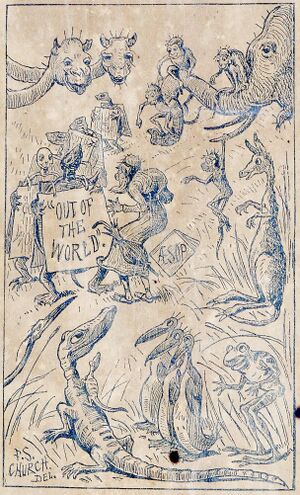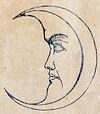
Aesop

Aesop doth with umbrella fare |
The Late Theosophical Baron
The Baron von Palm was a well-known character in our Chicago life. It was not strange that he adopted a Pagan belief. As Max Muller said of GoThe Baron von Palm was a well-known character in our Chicago life. It was not strange that he adopted a Pagan belief. As Max Muller said of Goethe, he was “a grand old heathen.” He moved about in the roar and bustle and stir of our busy streets without being a part of it. The modern rush of life never made any impression upon him. He drifted along on the calm surface outside of the swift current, and contented himself will looking and wondering at it. He might have been Cheops's Superintendent of Construction of the Pyramids or Chamberlain at the Court of Cephrenes so far as any connection with modern life is concerned. He had traveled the world over, heard all that was worth hearing, seen all that was worth seeing, sucked the orange dry and thrown the peel away, and he was therefore content to return to first principles. A glass of Tokay and a free ticket to the opera – and he was never without either – expressed to him the maximum of earthly pleasure. provided the Tokay was free from suspicion and the opera was good. There was, however, one slight link that connected him with the Present. There was a dash of the Harold Skimpole in his composition. The last request he made of the writer was for the temporary loan of a dollar. It was a dull time for the Theosoph. His favorite vender of Tokay, who, like himself, was something like a pagan and more of a schollar, had settled the doctrine of immortality and settled the strife of spirit by blowing his brains out, so that there was no more good Tokey to be had. It was out of the opera season also, after all his favorite singing birds had flown off to cooler spots. It was a dull, sad time for the Theosoph. If a dollar would have raised him to the maximum of earthly bliss he must have been stony-hearted who would have refused it, more particulary as the Theosoph would have given his last dollar to any one who had asked for it. He had participated in the stirring times of the German Revolution, had served under King Ferdinand, had waited upon royalty, had wandered in far countries, had been educated in diplomacy, had lived with the Indians in the Northwest, had dubbled in silver mines, bad made fortunes and lost them, knew the prime donne and all the daticing houris of the stage, would have made an excellent Caliph of Bagdad and a still better Plato, and yet was quiet, unostentatious, affable, courteous, simple-minded, coming out of his shell only when the opera came, having the good will of everybody and a good word for everybody.
Darwinism Vindicated
On one occasion, as the story goes, a beautiful sprightly little girl, brim full of animation, and overflowing with cheerfulness, when strolling in the fields one day, collecting flowers, making beautiful bouquets, and enjoying herself generally, she happened to step upon a little mouse, and instantly crushed it to death. The fact this girl, Katie Sunlight, had been instrumental in causing the death of a little mouse, created a wide spread consternation in the animal kingdom, and a court of inquiry was at once convened to test the fact whether innocent or guilty.
The presiding officer, whose hauteur Attracted universal attention, was the Hon. Chief Justice Muttonhead. His learned, dignified and urbane associate, Mr. Ghost, set with majestic mein on his right, while Esquire Porker, whose habit of keeping up a continual grant, rendered him obnoxious to all the Jews, set on his left. Mr. Crane, clerk of the court, with spectacles on, and with a pen behind each ear, looked like second Solomon, and as humble as a cat when preparing to jump at an unoffending bird. Sheriff Mastin summoned the jury, and then the trial of Katie Sunlight at once commenced. She plead <... continues on page 4-13 >
Editor's notes

